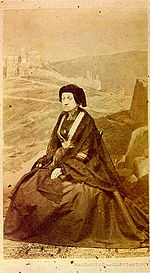- Maid of Athens, ere we part (George Byron)
-
Maid of Athens, ere we part is a poem by Lord Byron, written in 1810 and dedicated to a young girl of Athens [1].
- Maid of Athens, ere we part,
- Give, oh, give back my heart!
- Or, since that has left my breast,
- Keep it now, and take the rest!
- Hear my vow before I go,
- Ζωή μου, σᾶς ἀγαπῶ.
- [...]
Each stanza of the poem ends with the same Greek refrain, which Byron translated as "My life, I love you!". It may be viewed as an example of macaronic verse, although it obviously lacks the humorous intent typical of that genre.
History of the poem
According to C. G. Brouzas [2], Byron's "Maid of Athens" was born Teresa Macri or Macris in 1797. She was the daughter of Mrs. Tarsia Macri, at whose house Byron lodged briefly in 1809 and in February 1810. Byron apparently fell in love with the 12-year-old girl; in a letter to Henry Drury the poet declares to be "dying for love of three Greek Girls at Athens", "Teresa, Mariana, and Kattinka", and wrote the poem for her before departing for Istanbul. On his way back from Turkey to Morea, on July 17, 1810, he stayed at Mrs. Macri's house for another ten days. At some point he offered £500 for the girl — an offer which evidently was not accepted.
Byron never met Teresa again. She eventually married James Black (1803-1868) and died impoverished in 1875 in Athens, Greece [3].
See also
References
- ^ English Poetry II: From Collins to Fitzgerald. The Harvard Classics (1909–1914)
- ^ C. G. Brouzas, "Byron's Maid of Athens: Her family and surroundings". Philological Papers v. 7, 65--??, West Virginia University Bulletin, Series 49, n. 12--VI, June 1949. Reviewed by H. Jenkins in The Journal of Hellenic Studies v. 73, p. 200 (1953)
- ^ Richard Edgeumbe, letter to "The Times", October 25, 1875
Categories:- Poetry by Lord Byron
Wikimedia Foundation. 2010.

